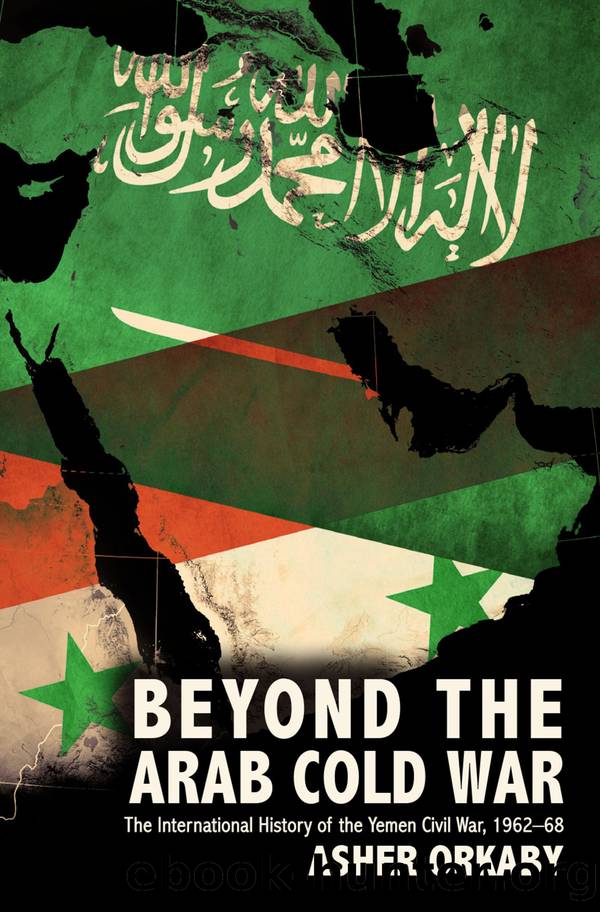Beyond the Arab Cold War by Asher Orkaby;

Author:Asher Orkaby;
Language: eng
Format: epub
Publisher: OUP Premium
Published: 2017-06-15T00:00:00+00:00
When the Norwegian mission to the UN approached UN diplomat Ralph Bunche for advice, he further dissuaded an Egyptian censure and expressed fear âthat a resolution might only complicate the Middle East situation.â81 The Norwegian Foreign Minister John Lyng told George Brown that âthe Scandinavians considered that their economic and political interests outweighed the moral issues.â Other NATO allies similarly shied away from taking an initiative. Delegates from Washington and London broached the subject with the Director-General of the Danish Ministry of Foreign Affairs Gunnar Seidenfaden, who explained that âthe Danes would want to avoid any initiative directed against the UAR. Danish shipping and economic interests in the Middle East would in this instance be likely to outweigh any moral feeling about poison gas.â82 Dutch representatives at the NATO Disarmaments Experts meeting in September further justified these economic concerns to George Brown, recognizing that âin light of the passions aroused by the Arab-Israeli war it would be difficult to secure condemnation of a major participant for the use of gas in the Yemen.â83
MP Emanuel Shinwell then suggested finding a Latin American country to carry out a political censure against the UARâs poison gas use, an idea that failed to take off, as the United States doubted that any of these countries would take the initiative.84 In what seems in retrospect an act of sheer desperation, Lee Dinsmore, the acting country director for Yemen in the US State Department, admitted that he was âapproaching a number of ânon Anglo-Saxon Nobel prize winnersâ with a view to organizing a protest against the use of poison gas in Yemen.â He told his British counterparts that the approaches were being made indirectly and the State Department was very keen that their part in organizing the protest should if possible not be exposed.85
The State Departmentâs âNobel schemeâ was hardly unprecedented, as the British had attempted a similar tactic with South Arabian representatives appealing to the UN. The most willing collaborator to this scheme was Hussein Ali Bayoumi, the pro-British Adeni minister of defence and the secretary-general of the United National Party of Aden. When Bayoumi first learned of the Egyptian use of poison gas, he expressed concern for Egyptian colonialism and tactics following South Yemenâs independence from Britain, originally scheduled for 1968: âThe people of South Arabia, who have struggled for so long to gain their freedom, are determined not to exchange the miseries of British colonialism for a life of slavery under the Egyptian imperialists.â86
Hillier-Fry suggested that the British use South Arabian petitioners, like Bayoumi, to publicize local concerns for Egyptian chemical weapons, as the imamâs royalist supporters did not have an official public voice. The token South Arabian could appeal to the UN for a mission to save them from the fate of their northern brethren at the hands of the Egyptian air force. Even in the worst possible scenario, if the UAR blocked Bayoumiâs petition, âwe might be able to get a certain amount of publicity for the suppression of a legitimate petition merely because it criticized the UAR.
Download
This site does not store any files on its server. We only index and link to content provided by other sites. Please contact the content providers to delete copyright contents if any and email us, we'll remove relevant links or contents immediately.
| Bahrain | Egypt |
| Iran | Iraq |
| Israel & Palestine | Jordan |
| Kuwait | Lebanon |
| Oman | Qatar |
| Saudi Arabia | Syria |
| Turkey | United Arab Emirates |
| Yemen |
Empire of the Sikhs by Patwant Singh(23065)
The Wind in My Hair by Masih Alinejad(5084)
Rise and Kill First by Ronen Bergman(4766)
The Templars by Dan Jones(4676)
The Rape of Nanking by Iris Chang(4193)
12 Strong by Doug Stanton(3541)
Blood and Sand by Alex Von Tunzelmann(3184)
Babylon's Ark by Lawrence Anthony(2666)
The History of Jihad: From Muhammad to ISIS by Spencer Robert(2614)
No Room for Small Dreams by Shimon Peres(2356)
The Turkish Psychedelic Explosion by Daniel Spicer(2349)
Inside the Middle East by Avi Melamed(2347)
Gideon's Spies: The Secret History of the Mossad by Gordon Thomas(2329)
Arabs by Eugene Rogan(2291)
The First Muslim The Story of Muhammad by Lesley Hazleton(2257)
Come, Tell Me How You Live by Mallowan Agatha Christie(2244)
Bus on Jaffa Road by Mike Kelly(2144)
1453 by Roger Crowley(2018)
Kabul 1841-42: Battle Story by Edmund Yorke(2014)
